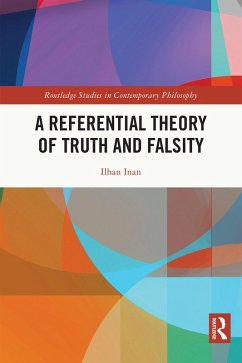
The Routledge Handbook of Epistemic Contextualism (eBook, ePUB)
Versandkostenfrei!
Sofort per Download lieferbar
48,95 €
inkl. MwSt.
Weitere Ausgaben:

PAYBACK Punkte
24 °P sammeln!
Epistemic contextualism is a recent and hotly debated topic in philosophy. Contextualists argue that the language we use to attribute knowledge can only be properly understood relative to a specified context. How much can our knowledge depend on context? Is there a limit, and if so, where does it lie? What is the relationship between epistemic contextualism and fundamental topics in philosophy such as objectivity, truth, and relativism?The Routledge Handbook of Epistemic Contextualism is an outstanding reference source to the key topics, problems, and debates in this exciting subject and is th...
Epistemic contextualism is a recent and hotly debated topic in philosophy. Contextualists argue that the language we use to attribute knowledge can only be properly understood relative to a specified context. How much can our knowledge depend on context? Is there a limit, and if so, where does it lie? What is the relationship between epistemic contextualism and fundamental topics in philosophy such as objectivity, truth, and relativism?
The Routledge Handbook of Epistemic Contextualism is an outstanding reference source to the key topics, problems, and debates in this exciting subject and is the first collection of its kind. Comprising thirty-seven chapters by a team of international contributors the Handbook is divided into eight parts:
The Routledge Handbook of Epistemic Contextualism is an outstanding reference source to the key topics, problems, and debates in this exciting subject and is the first collection of its kind. Comprising thirty-seven chapters by a team of international contributors the Handbook is divided into eight parts:
- Data and motivations for contextualism
- Methodological issues
- Epistemological implications
- Doing without contextualism
- Relativism and disagreement
- Semantic implementations
- Contextualism outside 'knows'
- Foundational linguistic issues.
Within these sections central issues, debates and problems are examined, including contextualism and thought experiments and paradoxes such as the Gettier problem and the lottery paradox; semantics and pragmatics; the relationship between contextualism, relativism, and disagreement; and contextualism about related topics like ethical judgments and modality.
The Routledge Handbook of Epistemic Contextualism is essential reading for students and researchers in epistemology and philosophy of language. It will also be very useful for those in related fields such as linguistics and philosophy of mind.
Dieser Download kann aus rechtlichen Gründen nur mit Rechnungsadresse in A, B, BG, CY, CZ, D, DK, EW, E, FIN, F, GR, HR, H, IRL, I, LT, L, LR, M, NL, PL, P, R, S, SLO, SK ausgeliefert werden.













